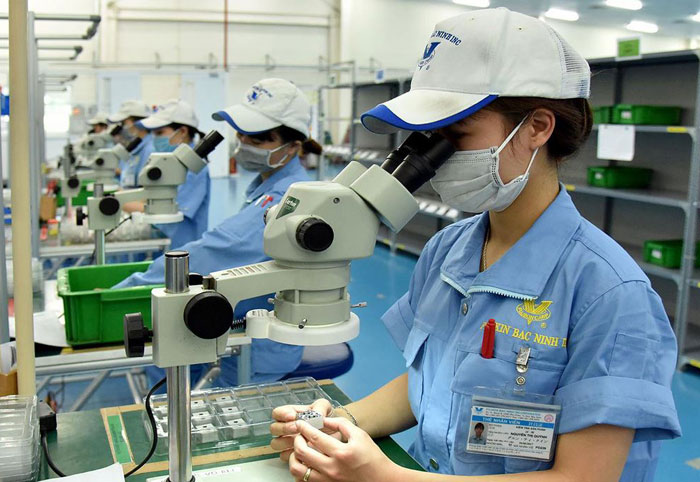 |
Market research firm Infocus Mekong Research released its Annual 2020 Vietnam Business Community Sentiment and Confidence Index, in which the survey of 242 CEOs and other leaders showed a huge drop in overall business confidence for 2020 compared to last year.
Specifically, 55 per cent of respondents said the economy would be worse in the post-COVID-19 period in 2020.
The numbers were largely a result of the coronavirus disease, and its impact over the globe but specifically in Vietnam.
“I have been living in Vietnam for over 26 years and have never seen such a huge plummet in overall confidence, not even during the 2010-2011 real estate bubble burst,” said Ralf Matthaes, managing director of Infocus Mekong Research and author of the survey.
Last year was a positive one in Vietnam for business with 7.02 per cent GDP growth, record growth in exports and foreign direct investment, and controlled inflation at 2.79 per cent.
Considering consumer confidence measures in December for 2020 were very high, with 70 per cent of consumers perceiving the economy to be better this year, the assumption would be that business sentiment follow suit.
However, 84 per cent of those surveyed noted the coronavirus would have a negative impact on their business this year.
According to Chris Hunt, managing director of Ho Chi Minh Securities Corporation, it is still early days living with COVID-19 but from a macro perspective its duration will dictate whether the world is simply experiencing a blip in macro activity, or the start of a serious and prolonged downtown.
When asked what these C-Suite executives were most concerned about in 2020, the impact of the coronavirus on their business, as well as global and Vietnamese economic slowdown, were dominating concerns compared to one year ago, where the environment was the number one concern.
Not every sector will be impacted the same, but some certainly more than others. JLL Vietnam country head Stephen Wyatt said that early indications suggest that hospitality, retail, food and beverages, and manufacturing and logistics sectors will be among the hardest hit.
“Some of our clients are reporting trading performance down between 20-50 per cent depending on the sector and location,” Wyatt explained.
Businesses with heavy reliance on China will obviously feel the impact, and many severely. Frederick Burke, managing partner of Baker McKenzie said in terms of Vietnam’s overall economic development strategy, it is “steady as she goes,” with the country’s drive to integrate into the global economy by means of bilateral and multilateral free trade agreements ensuring new opportunities for trade and investment over the coming years.
“In the short term however, 2020 will see challenges for many businesses that may not be strong enough to withstand the shocks to the supply chain and credit availability that we’re starting to see,” Burke explained.
“The tourism industry was the first to feel it, but even manufacturing for export is starting to feel the pain as imported components from China are getting held up in China’s shutdown. Resiliency in supply chains has already become a theme and now it is front and centre.”
When looking at Vietnam’s domestic services from advertising to zoos, Vietnam’s local economy will feel the pinch.
School closures adds uncertainty on productivity and parental burdens. Adding to this, the daily coronavirus warnings from the Ministry of Health have remained on the mind of Vietnamese consumers, reducing overall traffic flow and deadening demand.
However, all is not doom and gloom though. The big winners in 2020 are likely to be online shopping and delivery services, the automotive industry, packaged foods, and home care products, as consumers spend more time in the house and less time in public places.
Though online shopping only represents roughly 5 per cent of total retail value in 2019, today 76 per cent of consumers have purchased online in the past three months, with growth rates above 20 per cent annually.
With the outbreak impacting shopping behaviour by consumers wishing to avoid crowds, online services shall continue to grow and also recruit new customers to their services.
In terms of investor sentiment and the stock market, COVID-19 actually provides ample opportunity. “There is a sense of over-caution and thus, Vietnamese stock markets have not had to endure a significant decline,” said Andy Ho, managing director cum chief investment officer at VinaCapital.
“But as soon as a major economy such as China announces that COVID-19 is under control, we expect capital markets around the world including Vietnam to recover and possibly surpass levels seen at year end 2019.” VIR
Thanh Van

Vietnam urged to look beyond Asian markets for FDI amid Covid-19
Vietnam should take advantage of being the second country in Southeast Asia to sign a free trade agreement with the EU to attract FDI from Europe.

VN businesses seek Government support amid coronavirus losses
The coronavirus outbreak has affected the country’s economy, with production for exports and services suffering the most.
 Despite the novel coronavirus outbreak slashing Vietnam’s business confidence, experts are still optimistic for the remainder of 2020.
Despite the novel coronavirus outbreak slashing Vietnam’s business confidence, experts are still optimistic for the remainder of 2020.